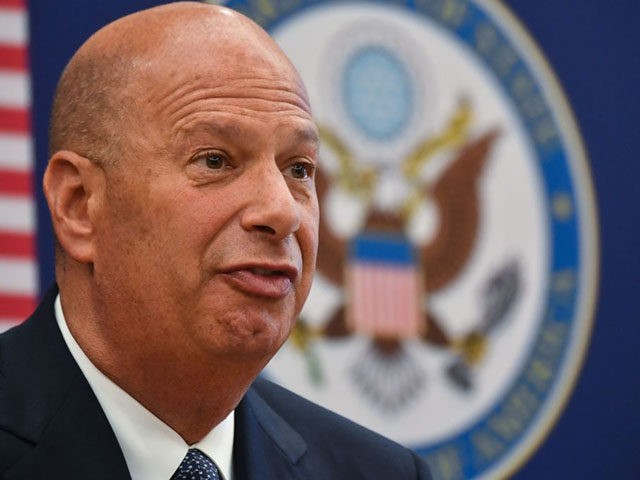CLAIM: Ambassador to the European Union Gordon Sondland confirmed, contrary to earlier testimony, that there had been a “quid pro quo” between President Donald Trump and the Ukrainian government: military aid for “dirt.”
VERDICT: FALSE. Sondland said that he “presumed” there was a “quid pro quo.” But he did not have any first-hand knowledge of one, and other witnesses have testified that there was no such “quid pro quo” at all.
The House Intelligence Committee began releasing transcripts this week of its behind-closed-doors interviews with witnesses in the “impeachment inquiry.” On Tuesday, it released the transcripts of the appearances of Sondland and former Special Representative for Ukraine Kurt Volker.
Volker testified that there had never been a “quid pro quo” — that he had never heard one discussed, and that Ukrainian officials seemed unaware of any such arrangement at all.
But Sondland, who had also testified earlier that there was no “quid pro quo,” had to amend that testimony after he was apparently contradicted by U.S. Ambassador to Ukraine Bill Taylor, who testified last month that he believed there was a “quid pro quo,” under which the Trump administration was withholding key military aid to Ukraine unless it investigated alleged corruption related to former Vice President Joe Biden and his son, Hunter Biden.
In a supplemental declaration filed with the committee, Sondland said that “by the beginning of September 2019, and in the absence of any credible explanation for the suspension of aid,” he “presumed that the [Ukraine] aid suspension had become linked to the proposed anti-corruption statement” and the investigation of the Bidens. That led him to tell the Ukrainian government that “resumption of U.S. aid would likely not occur” until it complied.
But there are two big logical leaps in Sondland’s statement.
The first is that he only “presumed” there was a “quid pro quo” — that is, he did not have direct knowledge of one.
The second is that he told the Ukrainians that a “quid pro quo” was “likely” — that is, he did not know with certainty.
In their rush to accuse the Trump administration of wrongdoing, Democrats and the media have overlooked one other key fact: the crucial August 2019 Politico article.
The article, “Trump holds up Ukraine military aid meant to confront Russia,” dated August 28, was the first that the Ukrainians ever knew about any withholding of aid — five weeks after the phone call between Trump and Ukraine president Volodymyr Zelensky which supposedly prompted the so-called “whistleblower” to approach Rep. Adam Schiff (D-CA) and the Democrats on the House Intelligence Committee. Sondland refers specifically to September.
Therefore what changed his — and others’ — impression was not anything the administration (or its representatives) did or said. Rather, it was the media.
Since Sondland consumes the same media that everyone else does — indeed, it is part of a diplomat’s job to know what is being said — he drew his own conclusions. But when he asked President Trump directly, Trump told him there was no “quid pro quo”: he just wanted Zelensky to do “the right thing.”
All of this presumes there is something wrong with a “quid pro quo.” But even that seems untrue. In fact, “quid pro quo” arrangements are normal in diplomacy. A House bill passed recently by Democrats would establish a “quid pro quo” that bars Russia from access even to private U.S. funds until it can be shown not to have interfered in U.S. elections. Trump, Democrats say, sought his personal or political interest; it also happened to be a national interest.
For years, Democrats defended the investigations of President Barack Obama’s administration into then-candidate Trump’s 2016 presidential campaign by arguing that the country had to know if a major candidate was corrupt or compromised by a foreign power.
That investigation may have been conducted in an unlawful manner — and a grand jury is now on the case — but the logic they used then is even more appropriate to Ukraine and the Bidens.
Hunter Biden’s role as a go-between for Burisma — a Ukrainian gas company suspected of corruption — and his father’s administration has never been fully investigated. The so-called “whistleblower” worked for Biden at the time; that conflict of interest, too, has never been explored.
If Trump had demanded a “quid pro quo,” he would have been doing his job. As it is, there is no evidence of a “quid pro quo” — certainly not from Gordon Sondland.
Joel B. Pollak is Senior Editor-at-Large at Breitbart News. He earned an A.B. in Social Studies and Environmental Science and Public Policy from Harvard College, and a J.D. from Harvard Law School. He is a winner of the 2018 Robert Novak Journalism Alumni Fellowship. He is also the co-author of How Trump Won: The Inside Story of a Revolution, which is available from Regnery. Follow him on Twitter at @joelpollak.

COMMENTS
Please let us know if you're having issues with commenting.